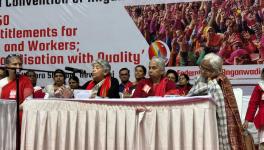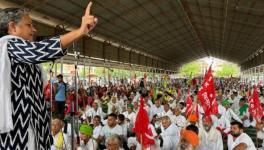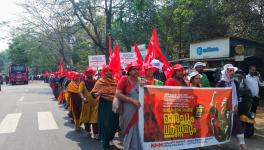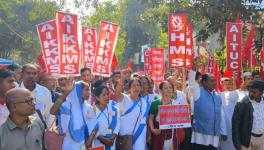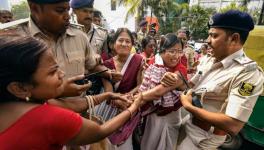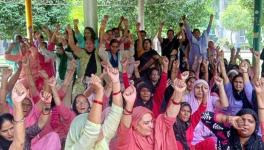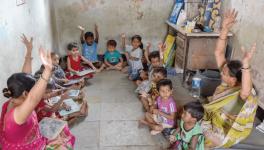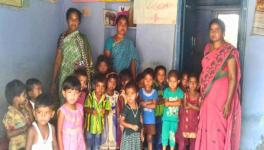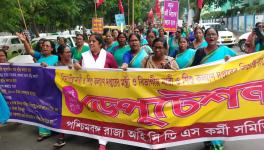Karnataka Anganwadi Workers to March Against State Govt’s Policies
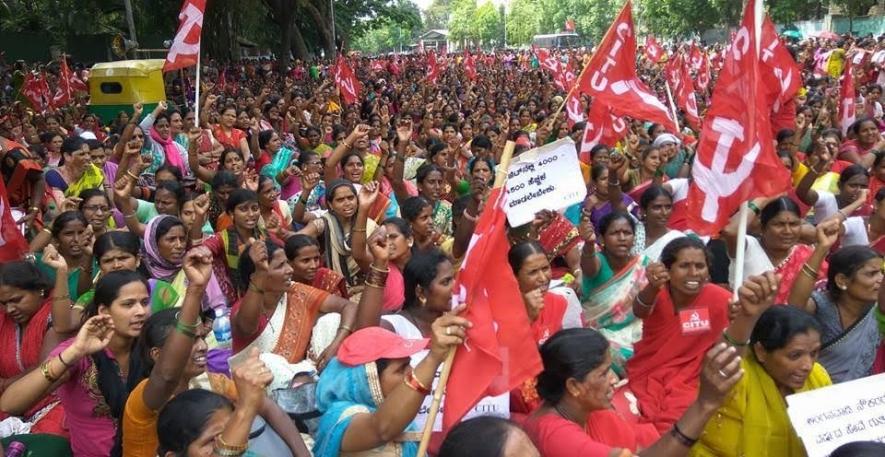
The anganwadi workers across Karnataka who have been opposing the state government’s policy to introduce LKG and UKG classes in existing government schools, are going for a Padayatra (long march) on December 10.
On May 17, the state government had issued an order to start pre-primary classes in the government schools. In the initial phase, as many as 176 government schools started the LKG and UKG classes in the beginning of the 2019-2020 academic year. As per the order, children of minimum three and half years can be admitted in the kindergartens and the pre-primary classes are aimed for children in the age group between three and half years and six years.
Since the introduction of this scheme, anganwadi workers across the state have been opposing it.
The protesting workers told NewsClick that they are not against the pre-primary classes but demand that these classes should be started in the existing anganwadi centres rather than duplicating the scheme in government schools.
“Around 176 centres have been started as a pilot project and these pre-primary schools are known as Karnataka Public School which function under the government school. As the new schools are meant for the children who fall under the age group of three and half years, same as that of anganwadis, there is no children in anganwadis in these areas,” S Varalakshmi, president of Karnataka State Anganwadi Workers’ Association, told NewsClick.
Read more: Karnataka Anganwadi Workers Protest Govt’s Decision to Introduce Pre-Primary Classes in Schools
The recommendations which are mentioned in the new order are already in place through the anganwadis which are part of the Integrated Child Development Scheme (ICDS). “So, it is just like a duplicate programme,” she said.
For example, as per the new recommendations, the timing for pre-primary schools is from 10 AM to 1.30 PM, whereas the anganwadi centres function between 9.30 AM and 4 PM. Another aspect of pre-primary schools as recommended under the new scheme is primary education, however, it is one of the main components under the ICDS scheme that is performed by the anganwadis.
“Nearly 40% physical development and 85% mental development of a child takes place before they turn six years old. So, it is important to ensure nutritious food for the children in those age group. ICDS has special focus on nutrition of the children. However, pre-primary schools offer mid-day meal which is not as nutritious as thhe food served in anganwadis,” Varalakshmi said adding that “experts are worrying only about the educational aspects, not about the nutritious food.”
As per the protesting workers, the government introduced the pre-primary schools as a measure to curtail the falling number of children in government schools. By introducing the pre-primary schools, government hopes that children who enrol in pre-primary schools will continue in the same school for the primary education.
“See, the students are going to private schools and the Karnataka government is encouraging the private lobby, too. Private schools are given permission by the Block Education Officer (BEO), a lawyer level officer. These officers sign all the applications that they. It is as if anyone can start the private schools. However, the government has not been monitoring these things,” Varalakshmi said, pointing towards the need of a strong education policy and need of empowering the government education system.
Additionally, the government is planning to recruit new teachers on contract basis for these primary centres. Once the pre-primary schools are established, the number of children in anganwadis will fall which would affect the life of anganwadi teachers and helpers.
Across Karnataka, there are around 16.5 lakh children in the age group of three and half years to six years. Also there are 65,000 anganwadi centres. “There are a number of anganwadi workers with the required expertise. Why don’t they make use of the expert teachers and strengthen the anganwadis by incorporating the pre-primary classes here,” Varalakshmi questioned.
“Our demands are to save the ICDS and stop implementation of the new programme,” she added. The workers across the state have already completed six padyatras covering all the 30 districts. On December 10, nearly 40,000 workers will march from Tamakuru to Bengaluru.
Get the latest reports & analysis with people's perspective on Protests, movements & deep analytical videos, discussions of the current affairs in your Telegram app. Subscribe to NewsClick's Telegram channel & get Real-Time updates on stories, as they get published on our website.










